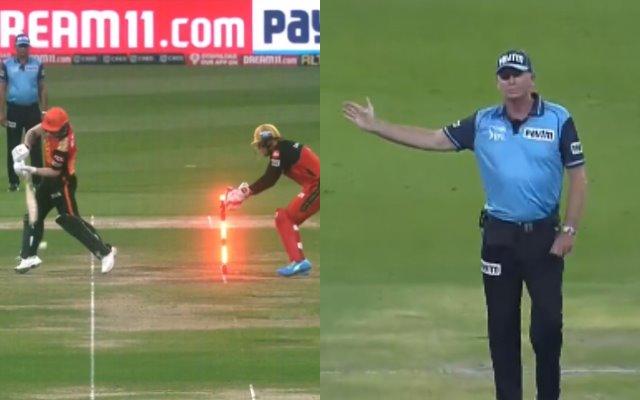IPL 2020: AB de Villiers disturbs bails before batsman plays the delivery, umpire calls it no-ball; here's what the law states
The incident took place in the 5th over of SRH's innings.
View : 9.1K
2 Min Read


The eliminator between SRH and RCB witnessed everything. Royal Challengers’ star-studded batting order was dismantled by SRH’s disciplined bowling effort and even Moeen Ali getting run-out on a free hit. Interestingly, it was a no-ball bowled by Washington Sundar which raised the eyebrows. However, it was an absolute legal delivery by Sundar but was given no-ball because of the wicketkeeper.
The off-spinner bowled a ball outside off stump and Warner pushed it towards the cover region. However, the stumps at the striker’s end were disturbed and everybody was amazed. By the first look, it looked like Warner has hit the stumps with his bat but later the things got clear and it was a rare occurrence.
Here is what happened:
AB de Villiers was keeping wickets for RCB and as soon as the ball hit the bat, De Villiers unintentionally disturbed the bails. He was standing right at the stumps as a spinner was bowling and while trying to collect the ball if it misses Warner’s bat, he came a lot closer to the stumps and disturbed it by mistake. However, de Villiers apologized and accepted his mistake immediately but it was given a no-ball.
Why was it given a no-ball:
As per the rule set by the rule-making body of cricket, MCC, the wicketkeeper should be behind the wickets while the ball is being delivered by the bowler. It further says that he should not disturb the batsman or the equipment including the wickets till the time ball passes the stumps or the batsman is not attempting a run. As Warner wasn’t attempting a run and the ball was still in play, the same was adjudged no-ball by the umpires.
Here’s the rule:
27.3 Position of wicket-keeper
27.3.1 The wicket-keeper shall remain wholly behind the wicket at the striker’s end from the moment the ball comes into play until a ball delivered by the bowler touches the bat or person of the striker or passes the wicket at the striker’s end or the striker attempts a run.
27.3.2 In the event of the wicket-keeper contravening this Law, the striker’s end umpire shall call and signal No ball as soon as applicable after the delivery of the ball.
Hence, it was a correct call from the umpires. The no-ball didn’t cost much to RCB as SRH scored only a single run on the free hit. However, the decision captured a lot of attention in this high voltage contest.
Download Our App